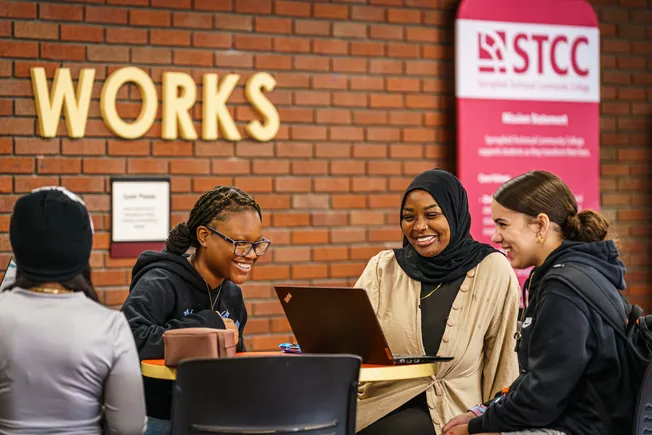Angelysmari Mateo is an 11th grader at Veritas Prep Charter School in Springfield, Massachusetts, but in early September, she and several of her classmates began taking college-level classes at nearby Springfield Technical Community College.
For Angelysmari, being on a college campus is exciting, even though the workload — including math, science, philosophy and English classes — can be challenging. She’s working on her high school and associate’s degrees simultaneously and has ambitions to be a cardiothoracic surgeon.
“When you’re on college campus, you’re around people that you wouldn’t be around in high school, people who have different experiences,” she said. “It’s very different.”
Exposing high schoolers like Angelysmari to college-level work and providing coaching for navigating college life — such as asking a professor for help and handling academic deadlines — is exactly what Veritas founder and CEO Rachel Romano envisioned when she started the school in 2012.
“When you prepare kids to have that as the option — when everyone is prepared to pursue a college degree — then all the doors are open to them,” said Romano, a former middle school teacher.
Veritas students have been taking early college classes at their own campus for several years, but this is the first year some students from the school are attending classes on the STCC campus.
The students’ college-life experience is made possible through a unique partnership between Veritas and STCC, as well as a new state program that launched this year and opens tuition-free access to community colleges for students younger than 25. The state previously only provided free tuition for people 25 and older.
Multiple measures of readiness
Veritas is a public charter school operating as its own district that draws students from the Springfield area. It was founded as a 5th-8th grade middle school and now has 700 students in grades 5-11. Plans are in place to add 12th grade next school year.
Student enrollment is based on a lottery system, and about 80% of the student body are low income, Romano said.
Veritas is a Massachusetts Early College Designated Program, which means it can offer early college courses on its campus taught by professors from their partner community colleges, including STCC and Worcester State University. Veritas offers students taking early college courses at both the Veritas and STCC campuses a companion class to review the course syllabus and the professor’s expectations for coursework, as well support in time management strategies and other college life demands, Romano said.
Students with disabilities, for instance, will get coaching in how to work with a college’s office of disability services to receive accommodations.
“It’s less about making sure every single kid is going on to college than it is about them having access, having a track record, knowing they can, and figuring out what’s the right path for them.”

Rachel Romano
Founder and CEO of Veritas Prep Charter School
Students in grades 9-11 can start taking early college classes for credit on the Veritas campus. About 50% of the 9th grade class are taking at least one course this year, Romano said. Of the 11th graders, 80% have taken at least one early college class at Veritas before this school year. Once students are 11th graders, they can begin college classes at the STCC campus.
Veritas has “multiple measures of readiness” — including grade point average, teacher recommendations and a student’s desire to participate — to ensure students are prepared for early college courses, Romano said.
Romano said that while Veritas would like to see every student enroll in an early college class, the program is designed with flexibility to meet student’s individual needs.
“Our goal is to give every single kid access when they’re ready,” Romano said. “We don’t want any of our students to feel like because they’re not ready to jump into early college classes as 9th or 10th graders, that they don’t belong with us.”
Slightly more than half of the 11th graders this year are working in cohorts to take a full-time or part-time course load at the community college, Romano said. Students could potentially earn their general studies associate degree by the end of high school, and they can transfer those credits to any 4-year college in Massachusetts that they get accepted to.
Still, college is not the expected journey for every student, Romano said.
“It’s less about making sure every single kid is going on to college than it is about them having access, having a track record, knowing they can, and figuring out what’s the right path for them,” Romano said.
Working through the logistics
Veritas and STCC officials had to consider logistics including transportation, scheduling, staffing and lunch to ensure the high school students had good experiences on the college campus.
“Operating in partnership at this level with other institutions is also just inherently challenging,” Romano said. “It just requires such strong communication and collaboration” between the partner schools.
Christopher Thuot, STCC’s vice president of academic affairs, agrees that effective communication, professional development and operational planning are essential for successful early college programs.
STCC, which has one campus, has seen enrollment grow due to the free tuition initiative, but the campus has space constraints. The school has about 5,000 students attending noncredit and credit courses.

Joseph Earls, an adjunct professor of English at Springfield Technical Community College in Springfield, Mass., leads a class of Veritas Prep Charter School students on Oct. 7, 2024, on the STCC campus.
Permission granted by Springfield Technical Community College
Still, the community college, which partners with a handful of schools, was eager to welcome the Veritas students, he said.
“We think that early college, early exposure to college coursework, is really key to building momentum for eventual college success,” he said, adding that the institution has an early college office to support high schoolers’ experience at STCC.
The work to open up learning on a college campus for high schoolers has been worth it, Romano said. “It’s just been really cool. I see them there on that campus, and I’m like, yeah, they’re good, they’ve got this, and they can go do anything,” she said.
The sense of belonging the high schoolers are experiencing at the STCC campus “will translate to any campus they land on,” Romano added.
Experiencing college life
Elijah Frederick, a Veritas 11th grader who is taking a full course load at the STCC campus this semester, said he feels welcomed at the college even though he is still a high schooler. He’s attended a back-to-school cookout and a fall festival at the college. He’s comfortable going to the school library, eating lunch that’s provided to all the early college students, and is getting more familiar with the faster pace of learning.
“We’re pretty much literally college students here,” said Elijah, who is aiming for a career in law.
Angelysmari, who is also a full-time student at the college, said she misses seeing friends who are on the Veritas campus, but she values her college experience — including the time and tuition savings of having worked toward her associate degree while in high school.
Elijah and Angelysmari credit Veritas for helping prepare them to be college students.
“We don’t get to see the college teachers every single day, and they don’t really remind you as much as the high school teachers would,” Elijah said. “If I had no preparation, it would be like jumping in the water with no swim training at all.”


